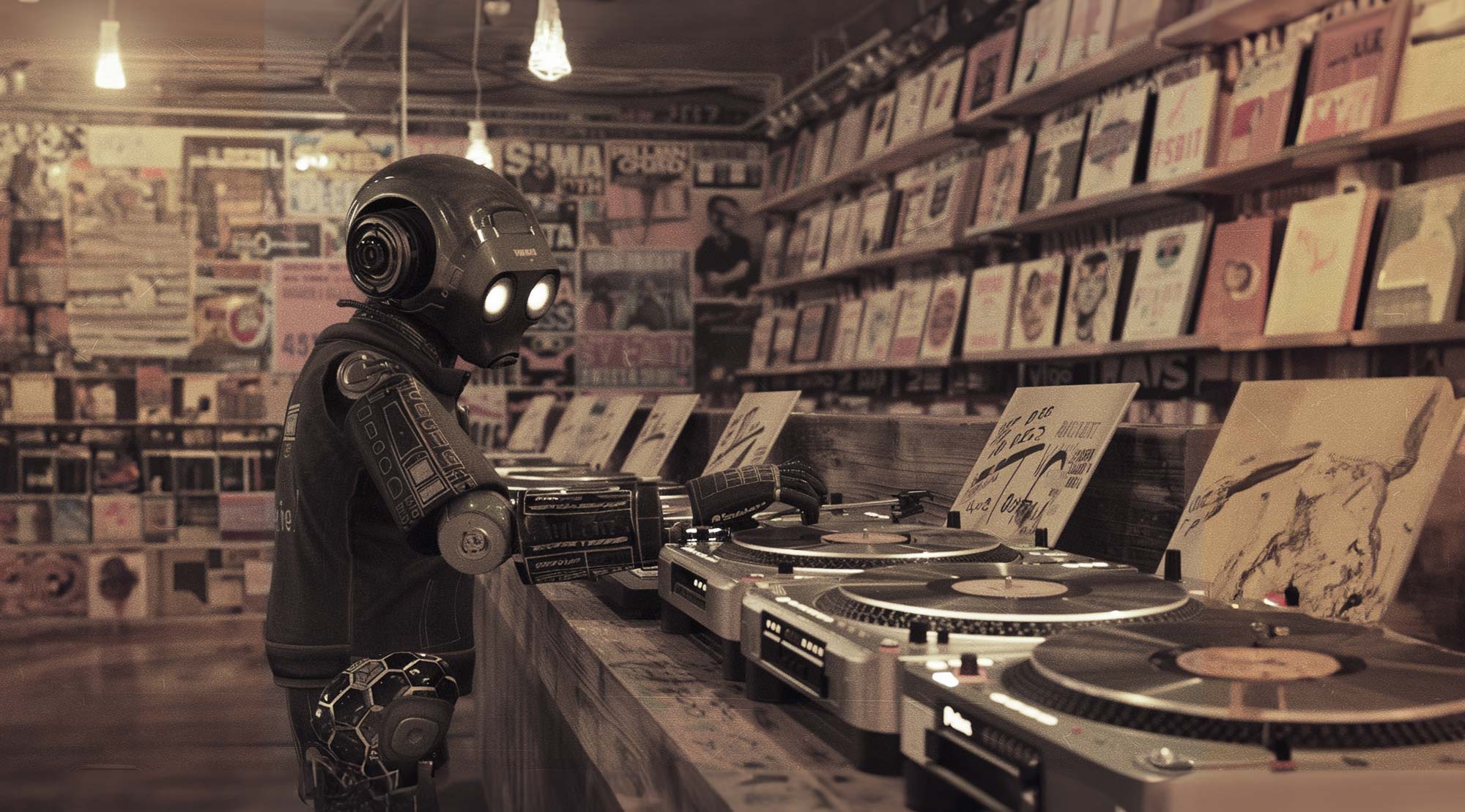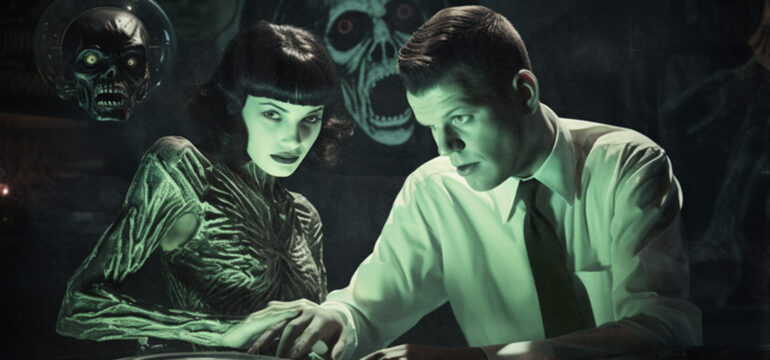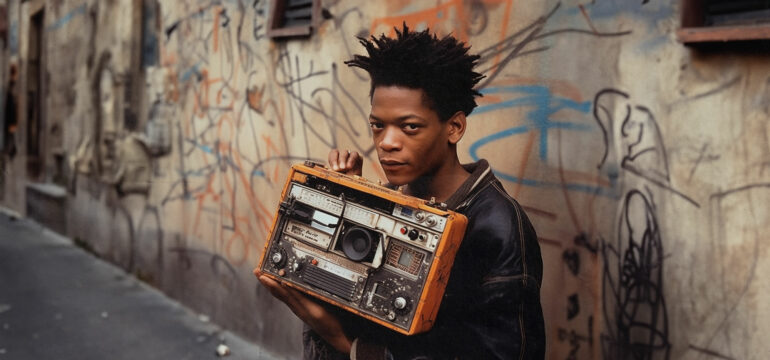Listeners:
Top listeners:
-
 play_arrow
play_arrow
Mad Nonstop
-
 play_arrow
play_arrow
Mad Radio Miami
-
 play_arrow
play_arrow
Mad Radio Bogotá
-
 play_arrow
play_arrow
Mad Radio Medellín
-
 play_arrow
play_arrow
Mad Records
-
 play_arrow
play_arrow
Mad Lo-Fi

From intelligent assistants in our homes to algorithms curating our social media feeds, AI is everywhere. And now, it’s also trying to take over the music world. With track mixing, playlist making, and even songwriting capabilities, one can’t help but wonder—can AI fully replace human DJs?
Now, let’s delve into what AI can do for you now, consider why human DJs are still killing it, and, ultimately, how the future might see both working with each other.
Current Capabilities of AI in Music and DJing
AI has some pretty cool tricks in terms of music and DJing, for example, analyzing your music taste and creating a playlist that, literally, hits all the right notes. Apps like djay from Algoriddim’s djay and Mubert use AI to mix tracks and create smooth, live sets on the fly.
But it doesn’t stop at that. AI is also taking up the task of authoring music. For instance, with the help of AIVA (Artificial Intelligence Virtual Artist) or OpenAI’s Jukebox, it’s possible to compose original tracks by learning to do so from thousands of existing songs. So, it’s not just mixing the beats but creating them from scratch and, in a way, showing little bits of what an AI DJ could do.
Unique Qualities of Human DJs
As much as AI makes inroads, there is an intangible or irreplaceable quality when human DJs take to the decks. But most importantly, there’s an emotional connection. A good DJ can read a crowd, feel a vibe, and know exactly what will follow in the next play to keep everyone on their feet. This goes far beyond the music; it’s all about creating an unforgettable experience.
Then again, there is creativity and improvisation. Human DJs love to change formats, mix them up between genres and love to surprise and delight the audience by throwing in that unexpected track. That is not so hard to program—a robot DJ could never figure it out.
And what about cultural influence? You could hardly say that a DJ is found without preliminary knowledge of the history of music and its tendencies. They break new sounds and styles, pushing the frame of what people are feeling and affecting the musical landscape. They tell a story with their music, and that part of being a storyteller is humanly unique.
How AI Can Complement Human DJs
Instead of being a replacement, perhaps AI is a marvelous sidekick for human DJs. It takes care of the technical aspects—beatmatching, transition—so the DJ can get even more creative with their set. And that means less time stressing over the details, with time to engage with the crowd properly.
AI can also create personalized experiences in ways that were never possible before. Imagine a club where the music was tuned to the taste of everyone within, making every experience unique; AI can analyze data in real-time to adjust music at a party to never let it die.
Efficiency is another huge plus. In this regard, AI does all the routine activities, and human DJs are provided with time to plan their sets, discover new music, and practice their skills. It’s about making DJs’ jobs better, not taking over those jobs.
Potential Benefits and Drawbacks of AI in the DJ Industry
Though every technology has pros and cons, AI applied in DJing is not an exception. On the brighter side, it will help AI ease specific works that are relatively more difficult and, making DJing easier for starters. This just means that more and more people can experiment with DJing without feeling overwhelmed. AI is also about consistency—something that ensures a quality performance that is free from human error. Another essential benefit is innovation. AI is going to bring whole new levels to the way one can interact with music, moving out of traditional DJing—and ways of creating unique remixes and mashups, among other untold ways. The AI can take tunes, mash them up, and even develop remixes never heard before to offer a new twist on a well-known tune.
But there are a few downfalls, too. It is no match for the human touch, the contributor to making such live performances a spectacle. The DJ communicates with his audience at an emotional level, something the algorithm would have a hard time doing. In addition, a concern may also be that with the betterment of AI concerning DJing, the human DJs may lose their livelihood. Another concern is the quality of experience. While it can mix tracks and create playlists, AI may not be able to provide the live set that makes the experience memorable—something that human improvisational skills and maybe that unique style of the DJ have.
The Future: AI and Human DJs Working Together
The future of this partnership between AI and human DJs holds considerable promise. Now, think about it: a collaborative performance where the AI handles the back end, freeing up the DJ to focus on his creativity and engaging the crowd. A collaboration like this could produce memorable performances that mix AI precision with human DJs’ flair.
AI tools can be further goading to creativity. For one, the DJ could use AI to execute experiments with fresh sounds and techniques that push music into new and exhilarating territories. Now, with routine tasks taken care of by AI, the DJ has even more liberty to innovate and elevate their craft. This is where the DJ could begin to evolve. Not fretting about the technical part of it, the DJ may focus on his real love: music. With AI in control of the nuts and bolts, DJs can now more freely get into the depths, creating innovative boutique-quality pieces that reflect their love and knowledge of music. This lets them bring novel and thrilling experiences to their audiences—experiences that, indeed, only true music lovers can experience.
Conclusion
For sure, AI is going to make significant waves, yet the world of music and DJing is engulfed in this great wave. It will not be substituted for human DJs for years to come. Instead, it opens up new, exciting potentials to improve performance and bring music further than we ever imagined. Uniquely human qualities in a DJ—emotional connection, creativity, and influence on the culture—cannot be replaced. Together, AI and human DJs can take musical experiences to even higher levels of greatness. What do you think? Can AI replace the DJ, or is the future all about collaboration? Share your thoughts with us!
Escrito por Mad Radio
Te puede interesar
© MadRadio. All rights reserved


